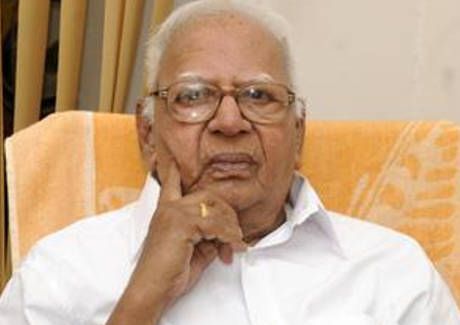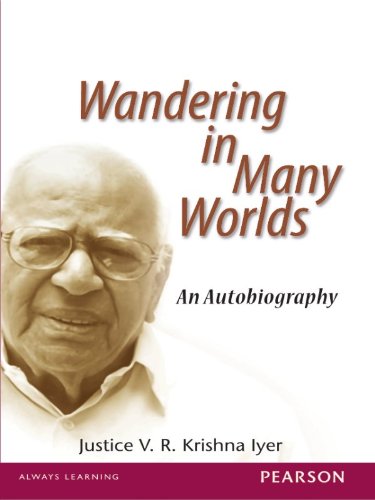
Only very few of my friends know, or now remember, that my career, so to speak, started with a stint working for Late Justice V.R. Krishna Iyer.
Before I joined the Reserve Bank of India, I nursed for long the idea of doing my Ph.D. in Environmental Economics. With that in mind, I had been reading up on the environment, and environmental economics, apart meeting people connected with environmental issues. I was staying in Trivandrum but used to go to Cochin for some work or the other. During these visits, I used to stay with my friend, Venu Rajamony, currently the Indian Ambassador to The Netherlands. It was around that time the Bhopal Gas Tragedy took place. Over breakfast one day, Venu’s father, K.S. Rajamony, renowned advocate, mentioned that Jce. V.R. Krishna Iyer, former Judge of the Supreme Court, was looking for someone to assist him on environment related matters. Considering my interest in the environment, he suggested that I take up the position. I readily agreed, not giving much thought to logistics or other arrangements. Later in the day, Venu’s father took me to Krishna Iyer.
Vaidyanathapuram Rama Iyer Krishna Iyer, which was his full name, was born in November 1915 near Palghat, which was then part of the Madras Presidency. So, he was already past 70, when I first met him. He studied law at Madras Law College, and followed in the footsteps of his father, V. Rama Iyer, also an eminent lawyer, who was practising then in Tellicherry, later part of the Cannanore District. Krishna Iyer demonstrated his legal acumen early in his career. More than that, he became known as a tireless worker against injustice, having been imprisoned in 1948 for fighting police atrocities in custody. In 1952, he was elected to the Madras Legislative Assembly from Tellicherry. After Malabar became part of Kerala in 1956, he would, as an independent, become a Minister in the first Communist Government in India, under EMS Namboodiripad. Around 1968, he would become a Judge of the Kerala High Court. He moved to the Supreme Court in 1973, from where he retired in 1980. Throughout his career as a judge, and before and after, he worked for the rights of the underprivileged and the downtrodden. Along with Jce. P.N. Bhagwati, he was responsible for making the legal system accessible to the common people, through Public Interest Litigations, legal aid, and otherwise. Let me not detain the reader with these details which are available in the public domain.
When I met Krishna Iyer, he had already retired from the Supreme Court five years earlier. Though his tenure at the Supreme Court was relatively short, he was responsible for several landmark judgements. And he left behind many legal pronouncements which have become legal sayings, and guideposts for future judicial decisions. One such statement was “bail is the norm, jail is the exception.” Justice A.S. Anand, former Chief Justice, would describe him as the Bhishma Pitamah of the Indian judiciary.
At the meeting with Krishna Iyer, it was agreed that I will start working for him immediately. It helped that my father and Krishna Iyer knew each other very well. For various reasons. As I would learn later, both good and bad. Let me digress to add some details here. My father had joined the administrative service in 1957, and was allotted to the Kerala cadre. Krishna Iyer had become a Minister the same year. The advantage of the 57 batch was that they grew with the politicians learning administration together. That way, they held a mutual respect for each other, almost as equals, something which is unthinkable today.
Later, my father was posted as Sub-Collector in Palghat, which was Krishna Iyer’s home territory. A few years later, my father was posted as District Collector for Cannanore (which included present day Kannur and Kasargod Districts). Cannanore was also a main sphere of both Krishna Iyer and his father, as Tellicherry, where they both practiced, was one of its important towns. From Cannanore, when my father was posted to FACT in Cochin, India’s first fertilizer company, Krishna Iyer would follow as a High Court Judge, and they would meet often at official and private functions. I remember seeing Sarada Krishna Iyer, his wife, with my mother, at a classical music concert. She was a proficient veena player. She had passed away in 1974.
No terms were fixed. And I would show up whenever I could. The brief was to prepare a note for a Ford Foundation funding for environmental law. I would spend a lot of time at the library of the Centre for Development Studies in Trivandrum, and the British Library, collecting notes and material. Every five to seven days, I would make a visit to Ernakulam and spend a few days there.
I mostly moved in with T. Padmanabhan, the renowned Malayalam short story writer, who was my father’s friend from his Cannanore days. If they say that the world is small, what more evidence was required; Padmanabhan, a lawyer by training, after graduating from the Madras Law College, had also started his career with V. Rama Iyer, Krishna Iyer’s father. At 91, Padmanabhan today leads a rather quiet life in Cannanore, now called Kannur, and continues to write, having won almost every Malayalam literary prize of note.
Whenever I went to Krishna Iyer’s house, there was always a large group of people there, each one waiting to get some work or the other done. After having put in a word to Nambiar, Krishna Iyer’s manager, I always called in without any delay. When I look back at those meetings, I picturise myself as an unemployed postgraduate, sitting with a retired Supreme Court judge, who was already a legend. But, such was the greatness of the man that he always treated me almost on equal terms, listened carefully to whatever I had to say. He was open to new ideas. And what struck me was humility, willing to listen to this 23 year old raw postgraduate, without any pre-judgement. And he always encouraged discussion even on matters that did not directly concern our work.
On one occasion, I asked him about the Supreme Court judgement of 1977 in the case relating to the newly elected Janata Government imposing President’s Rule in nine States through one letter. Later, in 1980, the newly elected Congress Government also dismissed nine State Governments. Various suits and writ petitions were filed in the Supreme Court in 1977, all of which were rejected. But, in the subsequent elections, the same dismissed governments came back to power. So, my question was whether the Supreme Court was not in the wrong, while giving that decision (The Supreme Court would later rectify it in the famous S.R. Bommai case). It didn’t take much time for Krishna Iyer to respond. He said that the people of the country proved to be more sensible than the Supreme Court.
On another occasion, I asked him about Uniform Civil Code. Krishna Iyer replied that while it was good in principle, the issue was how does one come to a judgement as to which civil code should be adopted to become uniform. How can the government make a value judgement that one civil code is better than the other. I left the discussion much humbler, convinced how what were seemingly simple solutions, had layers of complexity within.
Krishna Iyer’s speeches are known for their clarity and frankness. Even late in his life, which lasted 99 years, he was quite active, and brought to use his elephantine memory, recalling legal provisions and judgements from decades back, and base it on various disciplines. He embellished his speeches with a characteristic understated humour. Who will police the police, as he asked in one of our meetings. Many of his speeches are available online. See this for a typical speech where he dwells at length on values for a better world.
But his writings, though well argued, did not reach out to everyone equally. I for one found it a bit dense, a hangover from an earlier Boswellian era when ornamentation in language was the order of the day. His style would remind you of the writings of Edward Gibbon and Winston Churchill. But, what worked in his speeches stood out as distractions in the flow of his writing. This would have got amplified through his long legal career where the need to explain and justify every small legal point usually came at the cost of brevity and clarity. Admirers and hangers on praising every bit of his writing might have probably encouraged him to continue writing that way.
In our last meeting at his residence, before I joined the Reserve Bank, he handed me a copy of the Aligarh Law Journal where his article had been published. I quietly went through and I found it a bit too dense for me to understand. I could see that he was looking at me expectantly, as if he expected a word of appreciation from me. But, I quietly put it back without any comment.
As mentioned earlier, both my father and Mr. T. Padmanabhan, with whom I used to stay, knew Krishna Iyer quite well. While both admired Krishna Iyer for his professional competence and contribution to Indian jurisprudence, both had certain misgivings for altogether different reasons. Moreover, they felt that I was wasting my time. My father chose not to interfere in what I was doing, as he never did with my education or work. But, he might have asked Mr. Padmanabhan to have a chat with me.
My meetings with Krishna Iyer thereafter were random, and usually at airports. Once at the Trivandrum airport, when I was meeting him after three years, he picked up from where we had left three years earlier, and announced that the Ford Foundation funding had come through, and that we need to work more on it. Our meetings petered out thereafter, one reason being that there was no common ground that brought us together again, my interest in environmental economics taking a backseat after I joined the Reserve Bank. Moreover, Krishna Iyer was too busy a person till the end of his life.
One downside of working with Justice Krishna Iyer was that he spoilt me. I always set my bar too high whenever it came to expectations from my bosses. Not just in their knowledge and outlook, but in how they developed people working under them, being role models. Very few matched it, but I was lucky to have worked with quite a few of them, a long list that included R. Janakiraman, Y.V. Reddy, M.S. Verma, S.S. Tarapore, and many others who retired at lower levels. But they are stories for another day, on a different blog.

Krishna Iyer was a prolific writer who, I believe, published over 100 books. I managed to go through his autobiography, Wandering in Many Worlds, only recently.
There is a documentary on Justice Krishna Iyer available online. The first part is here.
As a believer in life after death, who had once claimed to have communicated with his late wife, who knows, he might still be as busy as ever. I will always treasure the days that I spent with him, however brief, mainly the human values and leadership qualities that I think I imbibed from him.
![]()